
Journal Menu
► ▼ Journal Menu-
- Agronomy Home
- Aims & Scope
- Editorial Board
- Reviewer Board
- Topical Advisory Panel
- Instructions for Authors
- Special Issues
- Topics
- Sections & Collections
- Article Processing Charge
- Indexing & Archiving
- Editor’s Choice Articles
- Most Cited & Viewed
- Journal Statistics
- Journal History
- Journal Awards
- Society Collaborations
- Conferences
- Editorial Office
Journal Browser
► ▼ Journal BrowserNeed Help?
Announcements
8 October 2024
Agronomy | Feature Papers in Section “Plant-Crop Biology and Biochemistry”
1. “The Influence of Humic Acids and Nitrophenols on Metabolic Compounds and Pesticide Behavior in Wheat under Biotic Stress”
by Piotr Iwaniuk, Stanisław Łuniewski, Piotr Kaczyński and Bożena Łozowicka
Agronomy 2023, 13(5), 1378; https://doi.org/10.3390/agronomy13051378
Full text available online: https://www.mdpi.com/2073-4395/13/5/1378
2. “Melatonin Mitigated Salinity Stress on Alfalfa by Improving Antioxidant Defense and Osmoregulation”
by Xiaoqian Guo,Yu Shi, Guanglong Zhu and Guisheng Zhou
Agronomy 2023, 13(7), 1727; https://doi.org/10.3390/agronomy13071727
Full text available online: https://www.mdpi.com/2073-4395/13/7/1727
3. “Effects of Combined Pollution of Tetracycline and Sulfamethazine on Tomato Growth and Antibiotic Absorption”
by Qiutong Xu and Mingkui Zhang
Agronomy 2023, 13(3), 762; https://doi.org/10.3390/agronomy13030762
Full text available online: https://www.mdpi.com/2073-4395/13/3/762
4. “Exogenous Application of Indol-3-Acetic Acid and Salicylic Acid Improves Tolerance to Salt Stress in Olive Plantlets (Olea europaea L. Cultivar Picual) in Growth Chamber Environments”
by María del Pilar Cordovilla, Carolina Aparicio, Manuel Melendo and Milagros Bueno
Agronomy 2023, 13(3), 647; https://doi.org/10.3390/agronomy13030647
Full text available online: https://www.mdpi.com/2073-4395/13/3/647
5. “Antioxidant Potentials of Different Genotypes of Cowpea (Vigna unguiculata L. Walp.) Cultivated in Bulgaria, Southern Europe”
by Milena Tankova Tzanova, Tsvetelina Dimitrova Stoilova, Mima Hristova Todorova, Neli Yovcheva Memdueva, Maria Asenova Gerdzhikova and Neli Hristova Grozeva
Agronomy 2023, 13(7), 1684; https://doi.org/10.3390/agronomy13071684
Full text available online: https://www.mdpi.com/2073-4395/13/7/1684
6. “Elicitation and Enhancement of Phenolics Synthesis with Zinc Oxide Nanoparticles and LED Light in Lilium candidum L. Cultures In Vitro”
by Piotr Pałka, Bożena Muszyńska, Agnieszka Szewczyk and Bożena Pawłowska
Agronomy 2023, 13(6),1437; https://doi.org/10.3390/agronomy13061437
Full text available online: https://www.mdpi.com/2073-4395/13/6/1437
7. “Hydrogen Peroxide Ameliorates the Adversities of Drought Stress during Germination and Seedling Growth in Sorghum (Sorghum bicolor L.)”
by Ki Eun Song, He Rin Hwang, e Sun Hee Hong, Petr Konvalina, Woo Jin Jun, Jin Woong Jung and Sangin Shim
Agronomy 2023, 13(2), 330; https://doi.org/10.3390/agronomy13020330
Full text available online: https://www.mdpi.com/2073-4395/13/2/330
8. “Evaluation of the Effect of ‘Candidatus Liberibacter Solanacearum’ Haplotypes in Tobacco Infection”
by Julien G. Levy, Azucena Mendoza-Herrera, Naveed Merchant, Katherine M. Berg-Falloure, Michael V. Kolomiets and Cecilia Tamborindeguy
Agronomy 2023, 13(2), 569; https://doi.org/10.3390/agronomy13020569
Full text available online: https://www.mdpi.com/2073-4395/13/2/569
9. “Characterization of Bioactive Phenolic Compounds in Seeds of Chilean Quinoa (Chenopodium quinoa Willd.) Germplasm”
by Archis Pandya, Björn Thiele, Stephan Köppchen, Andres Zurita-Silva, Björn Usadel and Fabio Fiorani
Agronomy 2023, 13(8), 2170; https://doi.org/10.3390/agronomy13082170
Full text available online: https://www.mdpi.com/2073-4395/13/8/2170
10. “Maize Grain Germination Is Accompanied by Acidification of the Environment”
by Konrad Wellmann, Jens Varnskühler, Gerhard Leubner-Metzger and Klaus Mummenhoff
Agronomy 2023, 13(7), 1819; https://doi.org/10.3390/agronomy13071819
Full text available online: https://www.mdpi.com/2073-4395/13/7/1819
8 October 2024
Agronomy | Feature Papers in Section “Farming Sustainability”
1. “Conservation Tillage Improves Soil Quality and Crop Yield in Hungary”
by Gergő Péter Kovács, Barbara Simon, István Balla, Boglárka Bozóki, Igor Dekemati, Csaba Gyuricza, Attila Percze and Márta Birkás
Agronomy 2023, 13(3), 894; https://doi.org/10.3390/agronomy13030894
Full text available online: https://www.mdpi.com/2073-4395/13/3/894
2. “Digestate Not Only Affects Nutrient Availability but Also Soil Quality Indicators”
by Ana María García-López, Antonio Delgado, Ofélia Anjos and Carmo Horta
Agronomy 2023, 13(5), 1308; https://doi.org/10.3390/agronomy13051308
Full text available online: https://www.mdpi.com/2073-4395/13/5/1308
3. “Soil Organic Carbon Significantly Increases When Perennial Biomass Plantations Are Reverted Back to Annual Arable Crops”
by Enrico Martani, Andrea Ferrarini, Astley Hastings and Stefano Amaducci
Agronomy 2023, 13(2), 447; https://doi.org/10.3390/agronomy13020447
Full text available online: https://www.mdpi.com/2073-4395/13/2/447
4. “Use of Medicinal and Aromatic Plant Residues for Partial Peat Substitution in Growing Media for Sonchus oleraceus Production”
by Antonios Chrysargyris, Christos Goumenos and Nikolaos Tzortzakis
Agronomy 2023, 13(4), 1074; https://doi.org/10.3390/agronomy13041074
Full text available online: https://www.mdpi.com/2073-4395/13/4/1074
5. “Domestic Herbivores, the Crucial Trophic Level for Sustainable Agriculture: Avenues for Reconnecting Livestock to Cropping Systems”
by Gilles Lemaire, Josette Garnier, Laíse da Silveira Pontes, Paulo César de Faccio Carvalho, Gilles Billen and Tangriani Simioni Assmann
Agronomy 2023, 13(4), 982; https://doi.org/10.3390/agronomy13040982
Full text available online: https://www.mdpi.com/2073-4395/13/4/982
6. “State of the Art and New Technologies to Recycle the Fertigation Effluents in Closed Soilless Cropping Systems Aiming to Maximise Water and Nutrient Use Efficiency in Greenhouse Crops”
by Dimitrios Savvas, Evangelos Giannothanasis, Theodora Ntanasi, Ioannis Karavidas and Georgia Ntatsi
Agronomy 2024, 14(1), 61; https://doi.org/10.3390/agronomy14010061
Full text available online: https://www.mdpi.com/2073-4395/14/1/61
7. “Yield and Quality of Processing Tomato as Improved by Biostimulants Based on Trichoderma sp. and Ascophyllum nodosum and Biodegradable Mulching Films”
by Ida Di Mola, Lucia Ottaiano, Eugenio Cozzolino, Roberta Marra, Stefania Vitale, Angela Pironti, Nunzio Fiorentino and Mauro Mori
Agronomy 2023, 13(3), 901; https://doi.org/10.3390/agronomy13030901
Full text available online: https://www.mdpi.com/2073-4395/13/3/901
8. “Effects of Organic Fertilizer Substitution on the Technical Efficiency among Farmers: Evidence from Bohai Rim Region in China”
by Long Zhang, Ting Meng, Zhexi Zhang and Yueying Mu
Agronomy 2023, 13(3), 761; https://doi.org/10.3390/agronomy13030761
Full text available online: https://www.mdpi.com/2073-4395/13/3/761
9. “Effect of Mycorrhizal Inoculation on Melon Plants under Deficit Irrigation Regimes”
by Alessandro Miceli, Filippo Vetrano, Livio Torta, Alessandro Esposito and Alessandra Moncada
Agronomy 2023, 13(2), 440; https://doi.org/10.3390/agronomy13020440
Full text available online: https://www.mdpi.com/2073-4395/13/2/440
10. “Risk Assessment and Limiting Soil Factors for Vine Production—Cu and Zn Contents in Vineyard Soils in Galicia (Rías Baixas D.O.)”
by Raquel Vázquez-Blanco, Rocío González-Feijoo, Claudia Campillo-Cora, David Fernández-Calviño and Daniel Arenas-Lago
Agronomy 2023, 13(2), 309; https://doi.org/10.3390/agronomy13020309
Full text available online: https://www.mdpi.com/2073-4395/13/2/309
8 October 2024
Agronomy | Feature Papers in Section “Weed Science and Weed Management”
1. “Herbicide Resistance: Managing Weeds in a Changing World”
by Rita Ofosu, Evans Duah Agyemang, Adrienn Márton, György Pásztor, János Taller and Gabriella Kazinczi
Agronomy 2023, 13(6), 1595; https://doi.org/10.3390/agronomy13061595
Full text available online: https://www.mdpi.com/2073-4395/13/6/1595
2. “Phytotoxic Effects of Essential Oils from Six Lamiaceae Species”
by Francesca Casella, Maurizio Vurro, Francesca Valerio, Enrico Vito Perrino, Giuseppe N. Mezzapesa and Angela Boari
Agronomy 2023, 13(1), 257; https://doi.org/10.3390/agronomy13010257
Full text available online: https://www.mdpi.com/2073-4395/13/1/257
3. “Assessing Herbicide Efficacy of Pelargonic Acid on Several Weed Species”
by Donato Loddo, Kishore Kumar Jagarapu, Elisa Strati, Giacomo Trespidi, Nebojša Nikolić, Roberta Masin, Antonio Berti and Stefan Otto
Agronomy 2023, 13(6), 1511; https://doi.org/10.3390/agronomy13061511
Full text available online: https://www.mdpi.com/2073-4395/13/6/1511
4. “Efficacy of Pendimethalin Rates on Barnyard Grass (Echinochloa crus-galli (L.) Beauv) and Their Effect on Photosynthetic Performance in Rice”
by Chinaza B. Onwuchekwa-Henry, Robert Coe, Floris Van Ogtrop, Rose Roche and Daniel K. Y. Tan
Agronomy 2023, 13(2), 582; https://doi.org/10.3390/agronomy13020582
Full text available online: https://www.mdpi.com/2073-4395/13/2/582
5. “Genetic and Morphological Variation of Belgian Cyperus esculentus L. Clonal Populations and Their Significance for Integrated Management”
by Sander De Ryck, Dirk Reheul, Jan De Riek, Ellen De Keyser and Benny De Cauwer
Agronomy 2023, 13(2), 572; https://doi.org/10.3390/agronomy13020572
Full text available online: https://www.mdpi.com/2073-4395/13/2/572
6. “The Potential of a Precision Agriculture (PA) Practice for In Situ Evaluation of Herbicide Efficacy and Selectivity in Durum Wheat (Triticum durum Desf.)”
by Panagiotis Kanatas, Ioannis Gazoulis, Nikolaos Antonopoulos, Alexandros Tataridas and Ilias Travlos
Agronomy 2023, 13(3), 732; https://doi.org/10.3390/agronomy13030732
Full text available online: https://www.mdpi.com/2073-4395/13/3/732
7. “Effects of Spectral Quality and Light Quantity of LEDs on In Vitro Shoot Development and Proliferation of Ananas comosus L. Merr”
by Valeria Cavallaro, Giovanni Avola, Giancarlo Fascella, Alessandra Pellegrino and Anita Ierna
Agronomy 2023, 13(4), 1072; https://doi.org/10.3390/agronomy13041072
Full text available online: https://www.mdpi.com/2073-4395/13/4/1072
8. “Biomass from Allelopathic Agroforestry and Invasive Plant Species as Soil Amendments for Weed Control—A Review”
by Antía Valiño, María Pardo-Muras, María Pardo-Muras, Carolina G. Puig, J. Eugenio López-Periago and Nuria Pedrol
Agronomy 2023, 13(12), 2880; https://doi.org/10.3390/agronomy13122880
Full text available online: https://www.mdpi.com/2073-4395/13/12/2880
9. “Assessing the Efficacy of Living and Dead Cover Crop Mixtures for Weed Suppression in Sweet Corn”
by Veronica L. Yurchak, Alan W. Leslie and Alan W. Leslie
Agronomy 2023, 13(3), 688; https://doi.org/10.3390/agronomy13030688
Full text available online: https://www.mdpi.com/2073-4395/13/3/688
10. “Performance of Drift-Reducing Nozzles in Controlling Small Weed Seedlings with Contact Herbicides”
by Benny De Cauwer, Ilke De Meuter, Sander De Ryck, Sander De Ryck, Ingrid Zwertvaegher and David Nuyttens
Agronomy 2023, 13(5), 1342; https://doi.org/10.3390/agronomy13051342
Full text available online: https://www.mdpi.com/2073-4395/13/5/1342
8 October 2024
Agronomy | Feature Papers in Section “Crop Breeding and Genetics”
1. “Seed Phenotyping and Genetic Diversity Assessment of Cowpea (V. unguiculata) Germplasm Collection”
by Ioannis Zafeiriou, Michalia Sakellariou and Photini V. Mylona
Agronomy 2023, 13(1), 274; https://doi.org/10.3390/agronomy13010274
Full text available online: https://www.mdpi.com/2073-4395/13/1/274
2. “Seed Priming Applied to Onion-Like Crops: State of the Art and Open Questions”
by Andrea Pagano, Anca Macovei, Xianzong Xia, Gregorio Padula, Roman Hołubowicz and Alma Balestrazzi
Agronomy 2023, 13(2), 288; https://doi.org/10.3390/agronomy13020288
Full text available online: https://www.mdpi.com/2073-4395/13/2/288
3. “Grapevine Phenology of White Cultivars in Rueda Designation of Origin (Spain) in Response to Weather Conditions and Potential Shifts under Warmer Climate”
by María Concepción Ramos and Jesús Yuste
Agronomy 2023, 13(1), 146; https://doi.org/10.3390/agronomy13010146
Full text available online: https://www.mdpi.com/2073-4395/13/1/146
4. “Improved Forage Quality in Alfalfa (Medicago sativa L.) via Selection for Increased Stem Fiber Digestibility”
by Zhanyou Xu, Deborah J. Heuschele, JoAnn F. S. Lamb, Hans-Joachim G. Jung and Deborah A. Samac
Agronomy 2023, 13(3), 770; https://doi.org/10.3390/agronomy13030770
Full text available online: https://www.mdpi.com/2073-4395/13/3/770
5. “Genome-Wide Association Study for Agronomic Traits in Wild Soybean (Glycine soja)”
by Woon Ji Kim, Byeong Hee Kang, Chang Yeok Moon, Sehee Kang, Seoyoung Shin, Sreeparna Chowdhury, Soon-Chun Jeong, Man-Soo Choi, Soo-Kwon Park, Jung-Kyung Moon and Bo-Keun Ha
Agronomy 2023, 13(3), 739; https://doi.org/10.3390/agronomy13030739
Full text available online: https://www.mdpi.com/2073-4395/13/3/739
6. “Characterization of Diverse Pepper (Capsicum spp.) Germplasms Based on Agro-Morphological Traits and Phytochemical Contents”
by Suyun Moon, Nayoung Ro, Junhong Kim, Ho-Cheol Ko, SuKyeung Lee, Hyeonseok Oh, Bichsaem Kim, Ho-Sun Lee and and Gi-An Lee
Agronomy 2023, 13(10), 2665; https://doi.org/10.3390/agronomy13102665
Full text available online: https://www.mdpi.com/2073-4395/13/10/2665
7. “Micropropagation of Duboisia Species: A Review on Current Status”
by Yuxin Xue, Jayeni Chathurika Amarathunga Hiti-Bandaralage and Neena Mitter
Agronomy 2023, 13(3), 797; https://doi.org/10.3390/agronomy13030797
Full text available online: https://www.mdpi.com/2073-4395/13/3/797
8. “Finding Phenotypic Biomarkers for Drought Tolerance in Solanum tuberosum”
by Karin I. Köhl, Gedif Mulugeta Aneley and Manuela Haas
Agronomy 2023, 13(6), 1457; https://doi.org/10.3390/agronomy13061457
Full text available online: https://www.mdpi.com/2073-4395/13/6/1457
9. “Contribution of Arbuscular Mycorrhizal Fungi (AMF) in Improving the Growth and Yield Performances of Flax (Linum usitatissimum L.) to Salinity Stress”
by Ioanna Kakabouki, Panteleimon Stavropoulos, Ioannis Roussis, Antonios Mavroeidis and Dimitrios Bilalis
Agronomy 2023, 13(9), 2416; https://doi.org/10.3390/agronomy13092416
Full text available online: https://www.mdpi.com/2073-4395/13/9/2416
10. “Genome-Wide Association Study (GWAS) of the Agronomic Traits and Phenolic Content in Sorghum (Sorghum bicolor L.) Genotypes”
by Ye-Jin Lee, Baul Yang, Woon Ji Kim, Juyoung Kim, Soon-Jae Kwon, Soon-Jae Kwon, Joon-Woo Ahn, Sang Hoon Kim, Eui-Shik Rha, Bo-Keun Ha et al.
Agronomy 2023, 13(6), 1449; https://doi.org/10.3390/agronomy13061449
Full text available online: https://www.mdpi.com/2073-4395/13/6/1449
4 October 2024
MDPI INSIGHTS: The CEO's Letter #16 - UNGA79 Science Summit, OASPA, Peer Review Week

Welcome to the MDPI Insights: The CEO's Letter.
In these monthly letters, I will showcase two key aspects of our work at MDPI: our commitment to empowering researchers and our determination to facilitating open scientific exchange.
Opening Thoughts

MDPI Joins the Science Summit at UNGA79 (23–27 September 2024, New York)

On Friday 27 September, I had the privilege of giving the opening talk at the “Youth at the Science Summit” panel during the Science Summit conference, held in New York at the 79th session of the United Nations General Assembly (UNGA). Together, we discussed the future of science, publishing, innovation, and sustainable development.
It was a great opportunity to learn from our young leaders, whose voices must be included in the conversation as science shapes the future of artificial intelligence, climate mitigation, healthcare, technology, and more. This was also a powerful reminder of how essential global collaboration is in solving the major challenges we face. I left inspired by the dedication of these young researchers to making the world a better place!
Today’s youth are not just the leaders of tomorrow – they are already leading the change today.
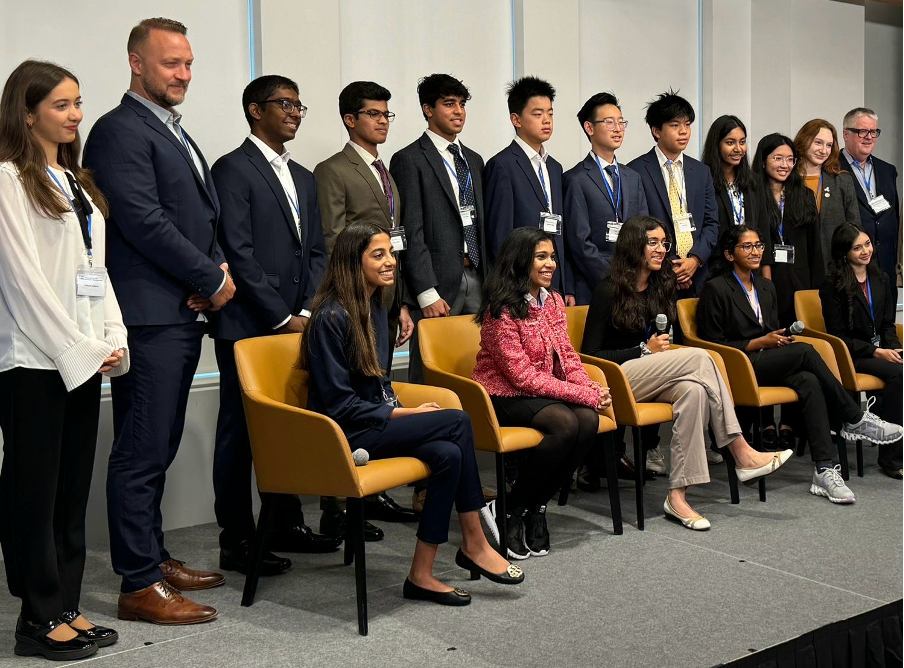
Stefan Tochev (second from left) at the UNGA Science Summit 2024: “A great opportunity to learn from our young leaders.”
MDPI Supports the Future Generation of Scientists
This aligns with MDPI’s mission to support the next generation of scientists and early-career researchers by recognizing their achievements through our various MDPI awards, including the Young Investigator Awards, Best PhD Thesis Awards, Travel Awards, and more.

Our presence at this global event showed our commitment to advancing Open Science as a key driver for sustainable development. As a leading Open Access (OA) publisher, MDPI’s role at the summit was to emphasize the critical importance of democratizing scientific knowledge, making it accessible to all, and promoting global collaboration.
Through OA publishing, we aim to address pressing global challenges such as climate change, public health, and inequality, in line with the United Nations Sustainable Development Goals (SDGs).
“We aim to address pressing global challenges”
MDPI and the SDGs
In 2020, the SDG Publishers Compact was launched to accelerate implementation of the SDGs by promoting content that informs, develops, and inspires action. MDPI joined this initiative in 2021 and subsequently launched the MDPI SDG Hub in 2022, offering free access to recent research within the scope of each of the 17 SDGs.
During the summit, we highlighted the connection between Open Science and the SDG Publishers Compact, supporting the core objective to “Leave No One Behind” (LNOB). The transformative promise of the SDGs relies heavily on the Open Access model, which serves as a fundamental enabler of Open Science. We advocate for the wider adoption of Open Science practices in order to achieve the SDGs by 2030.
Impactful Research
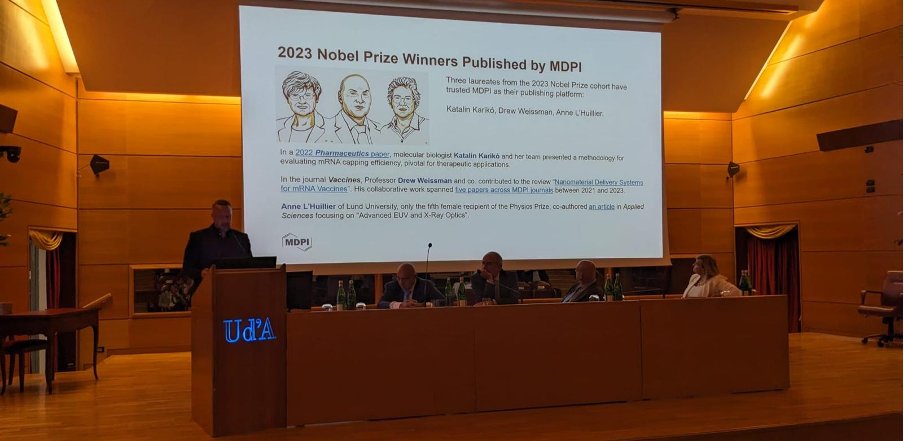
Presenting at the 1st International Conference of Environmental Medicine
In September, MDPI and our journals IJERPH and Diseases sponsored and participated in the 1st International Conference of Environmental Medicine: Environmental Threats to Human Health: From Genetics to Epigenetics, held in Chieti, Italy.
The conference was organized in collaboration with various societies, including the Italian Society of Environmental Medicine (SIMA), one of more than 160 societies partnering MDPI journals.
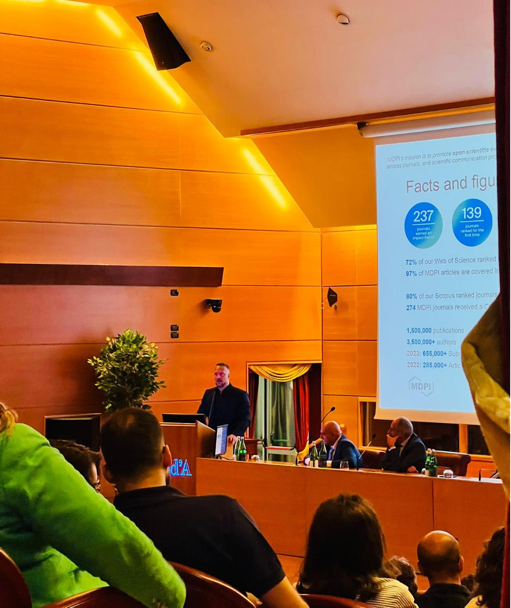
The conference brought together influential figures from the Italian scholarly community, such as Antonio Felice Uricchio (President of the National Agency for University Research Assessment [ANVUR]), Alessandro Miani (President of SIMA), and Liborio Stuppia (Director of ‘Gabriele d’Annunzio’ University of Chieti-Pescara), among others.
MDPI was the sole publishing sponsor of the conference, at which I had the opportunity to present on behalf of the company. I provided an overview of MDPI, covering key facts and figures, the peer-review process, our strong collaboration with the Italian market, and insights into Nobel Prize winners who have published with MDPI, ahead of Sir Richard Roberts’ Nobel lecture.
“As at September 2024, 44 Nobel laureates have contributed to over 115 articles across 35 MDPI journals”

The keynote speaker at the event was Sir Richard Roberts, Nobel Laureate and 1993 Nobel Prize winner in Medicine, recognized for his discovery of split genes.
Nobel Laureates’ Contributions to MDPI
As at September 2024, 44 Nobel laureates have contributed to over 115 articles across 35 MDPI journals. I’ll share more details on this in the October newsletter.
Hosting such prominent figures in their respective fields, who play a significant role in advancing the OA movement, of which we are leaders in, resonates deeply with our editorial teams.
Sponsoring and supporting academic conferences is something we do on a large scale, and it continues to grow. Attending and speaking about MDPI shows our commitment by taking the time to connect with the scholarly community in person.
MDPI’s Presence in Italy
Italy ranks third globally in total MDPI publications, with nearly 130,000 contributions. We collaborate with about 12,000 Editorial Board Members in Italy, over 6,100 of whom have an H-index of more than 25.
We have 83 Editors-in-Chief and 209 Section Editors-in-Chief from Italy. We also support 20 Italian universities through our Institutional Open Access Program (IOAP) agreements with major institutions such as Sapienza University of Rome, the University of Milan, and the University of Pisa, among others.
Inside MDPI

Celebrating Peer Review Week, 23–27 September 2024
As we conclude another productive month at MDPI, I am pleased to highlight our participation in this year’s Peer Review Week (PRW), which took place from 23–27 September 2024. This global, community-driven celebration underscores the vital importance of peer review in maintaining the integrity and reliability of academic work. PRW provide a platform for institutions, publishers, and scholars to come together and reflect on the processes that uphold the quality of scholarly communication.
“We remain committed to enhancing the peer review process”
The theme for PRW 2024 was ‘Innovation and Technology in Peer Review.’ At MDPI, we were proud to contribute through various online and in-person events, including webinars from Europe, Asia-Pacific, and a roundtable discussion on innovation and technology in peer review. These events offer an opportunity to explore new tools and technologies that are shaping the future of peer review, particularly the integration of AI. As a company, we remain committed to enhancing the peer review process with innovative solutions while preserving the essential human expertise that makes it effective.
Peer Review Innovation and Technology at MDPI
Our efforts to improve peer review extend beyond the activities of this week. We also released a blog article discussing New Tools for Advancing Research Integrity and Peer Review, where we highlight two tools that MDPI has developed to support research integrity: Eureka – Reviewer Recommender and Online Proofreader. We are continually refining SuSy, our in-house submission system, to provide a seamless experience for authors and reviewers alike.
Listening to MDPI’s Authors and Reviewers
We highly value the time of our reviewers, and so do the authors who contribute to our journals. Our editorial process is bolstered by a network of dedicated reviewers, a team of over 6,000 diligent, well-trained staff members, and an in-house article submission platform designed to ensure efficient processes.
We make it a point to continually improve the experiences of both our authors and our reviewers throughout the entire editorial process, from submission to publication. This is why we regularly ask for feedback by conducting surveys. Here is what some of our respondents recently had to say about working with MDPI:
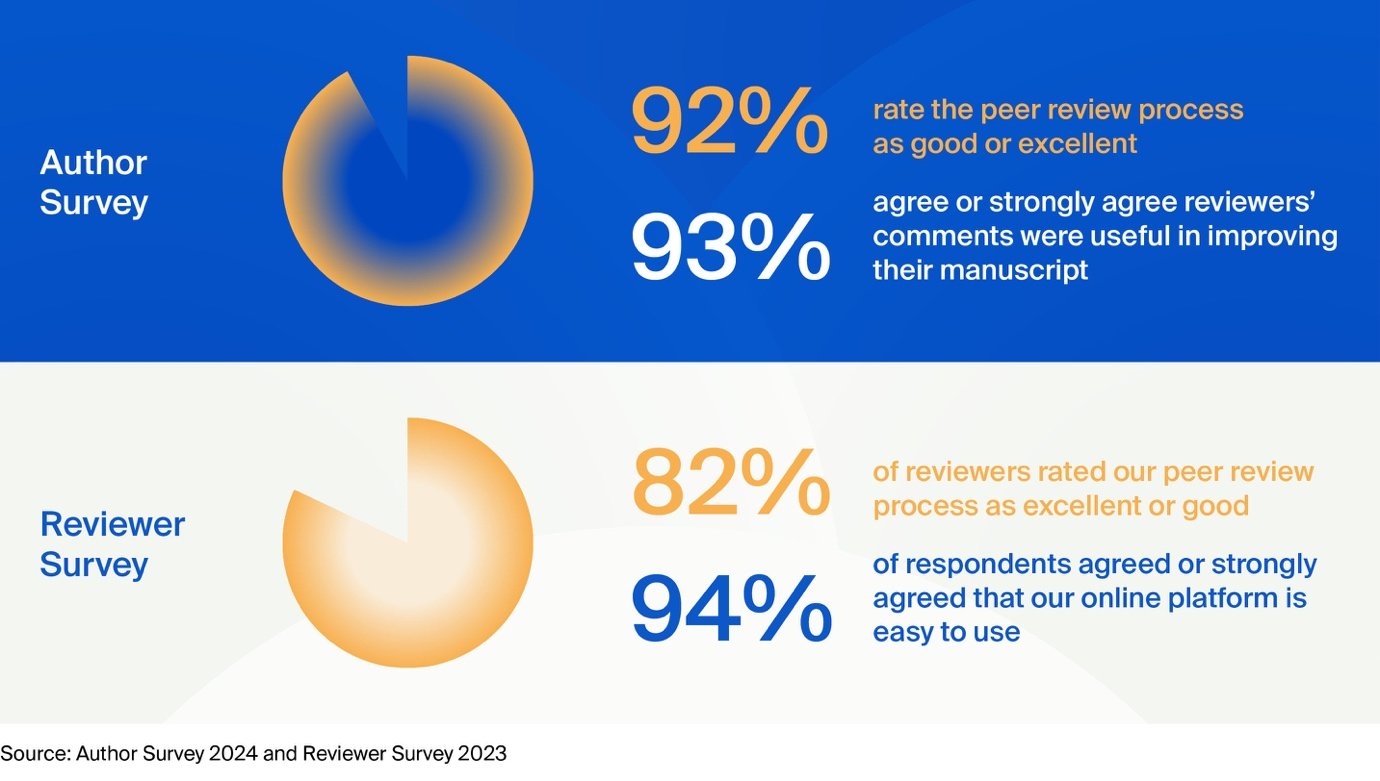
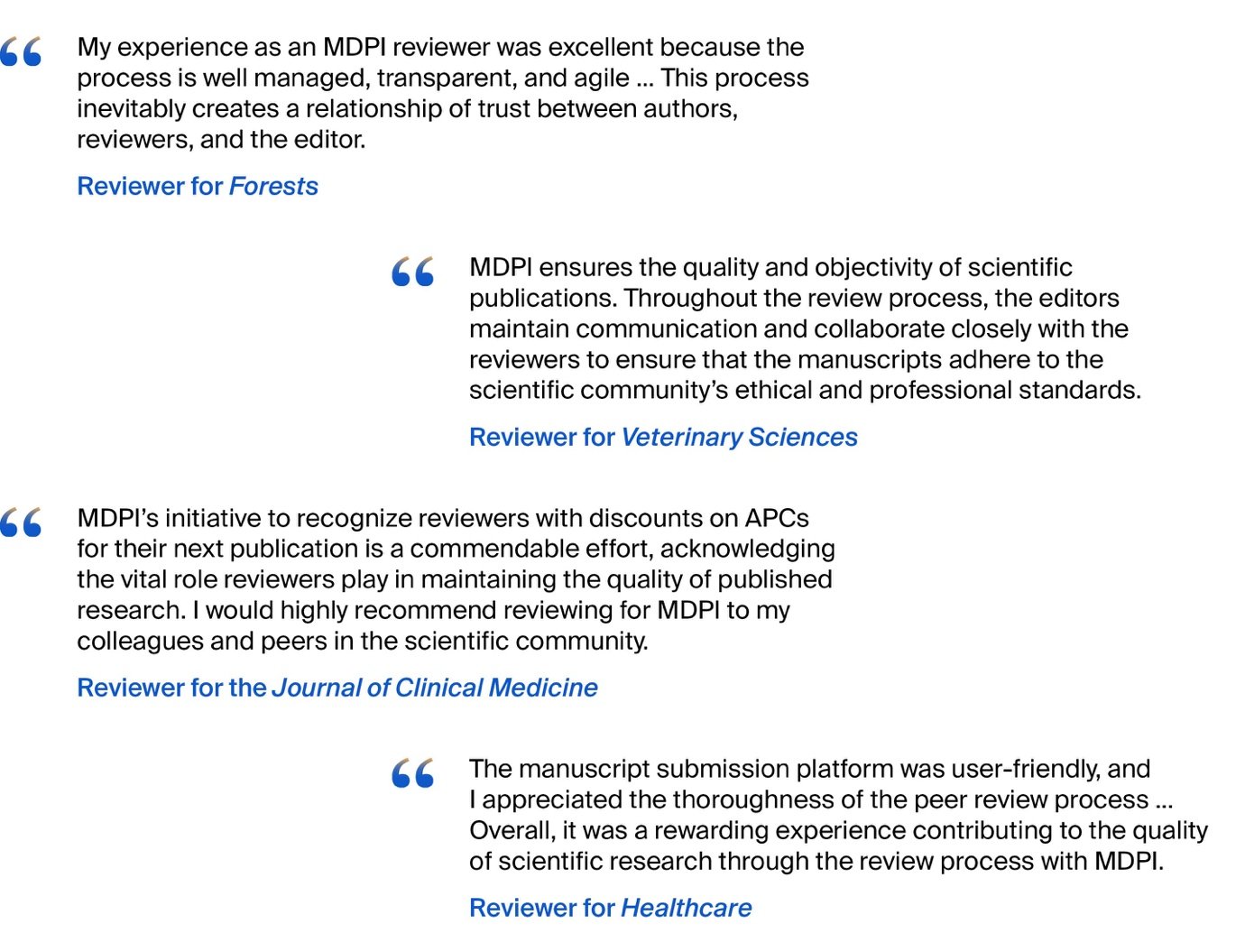
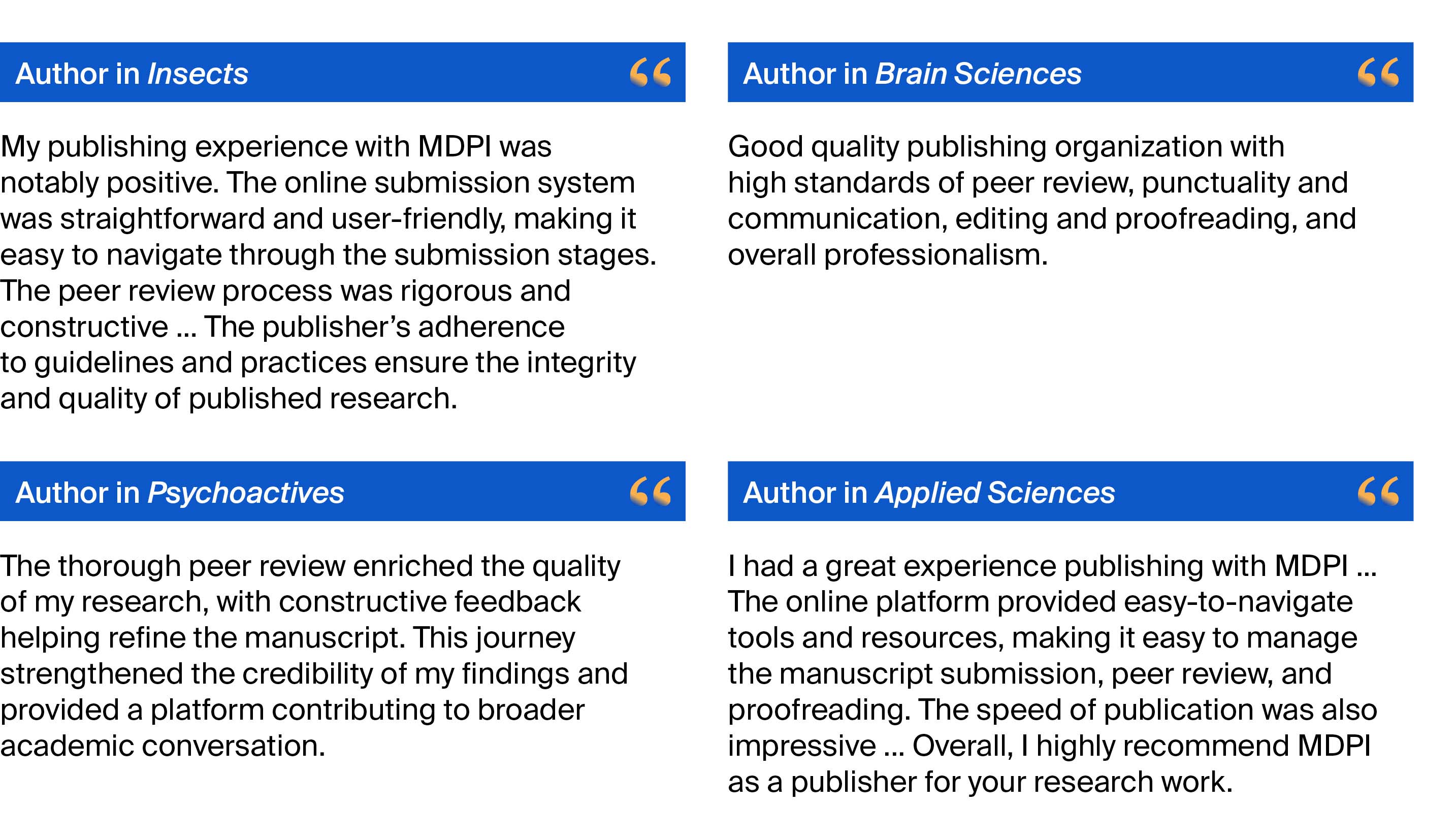
Coming Together for Science

ICM 2024 – Advances in Material Innovation
I am pleased to share that we held The 5th International Conference on Materials: Advances in Material Innovation (ICM 2024) in Basel, Switzerland this past 25–27 September.
This intimate event brought together leading scientists, researchers, and industry experts to exchange insights on recent advancements in materials characterization, processing, and manufacturing. Key focus areas included nanotechnology in material sciences and engineering, optical, electrical, and magnetic materials, soft, biological, and biomaterials, fibres, membranes, thin films, sensing materials, as well as materials and devices for energy and solar fuels. In addition, discussions featured the integration of AI and machine learning in materials research.
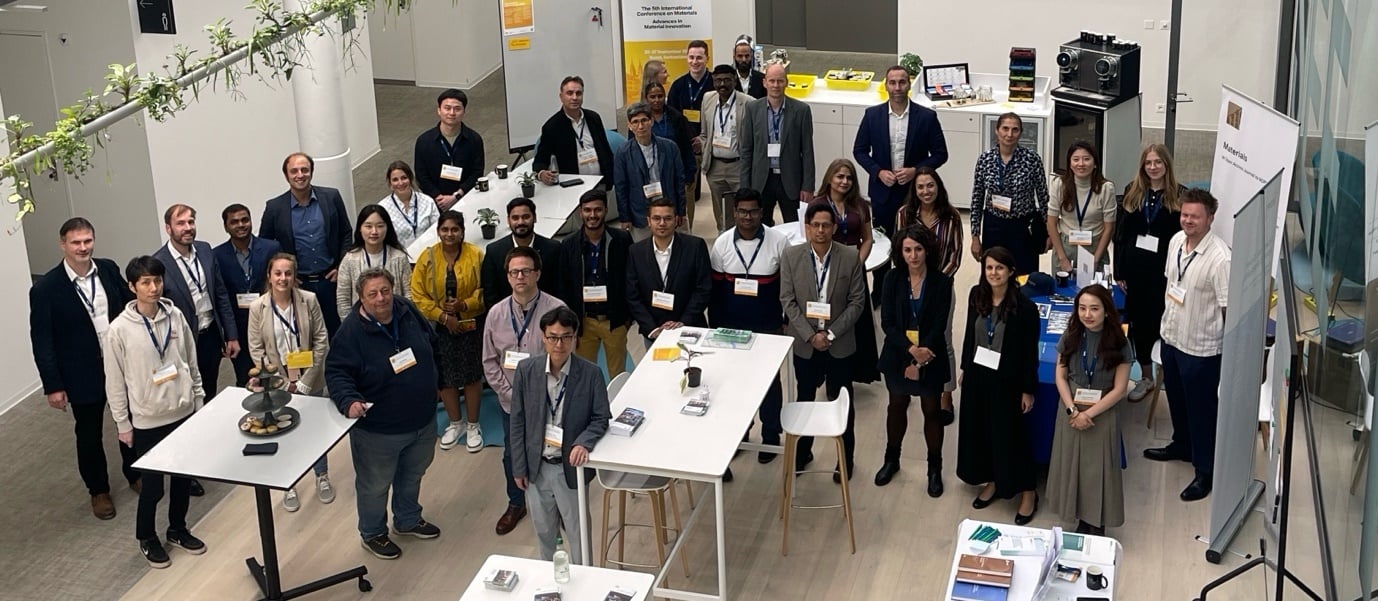
We received 90 abstract submissions. Over the course of the three-day event, 18 posters were displayed, and 34 talks were delivered, including three plenary speeches, seven invited talks, and 24 selected oral presentations.
A special thank-you to our partnering societies The Polish Membrane Society and The North American Thermal Analysis Society, as well as our sponsor, Nanomegas, for their support of the ICM conference. I am also pleased to share that we presented three awards, including the Best Presentation Award and two Best Poster Awards, recognizing the outstanding contributions of our participants.
Upcoming In-Person Event
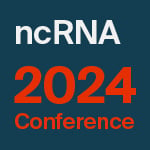
7–9 October 2024
Non-coding RNA World 2024: Exploring Mechanisms, Designing Medicines
Location: Basel, Switzerland
ncRNA 2024 will explore the latest advances in the field, covering topics from basic biology to medical and technological applications.
Find more upcoming MDPI events here.
Closing Thoughts
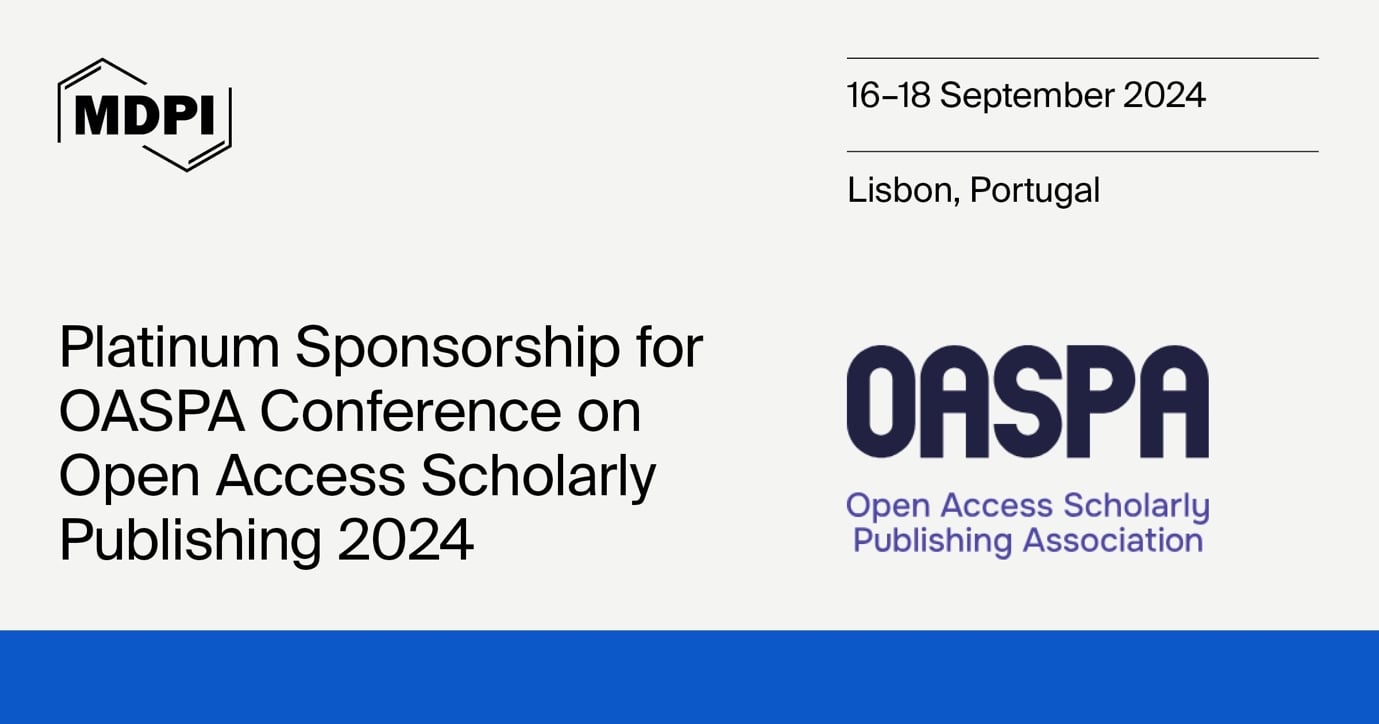
Reflections from OASPA 2024 Conference in Lisbon (16–18 September)
Amidst my September travels, I also had pleasure of attending the OASPA 2024 Conference in Lisbon from 16–18 September. It’s the first in-person Open Access Scholarly Publishing Association (OASPA) event in five years, and being in the sunny city of Lisbon made it even better! MDPI has long been a member of OASPA, and attending this conference gave us an opportunity to connect with other key members of the organization to see the latest developments in the OA movement.
“I believe that publishers have a lot to offer in terms of data and insights”
Main Themes from OASPA 2024
The main themes covered were equity and inclusivity, diamond OA, AI and openness, OA books, research integrity, and how OA can address broader societal challenges such as climate change. While it was great to see the latest developments in these areas, it was also clear that certain voices were missing, particularly those of major publishers. Although it’s not easy to incorporate every perspective, I believe that publishers, including MDPI, have a lot to offer in terms of data and insights. During the membership meeting, a few of us raised the point that large-scale publisher input could add value to these discussions.
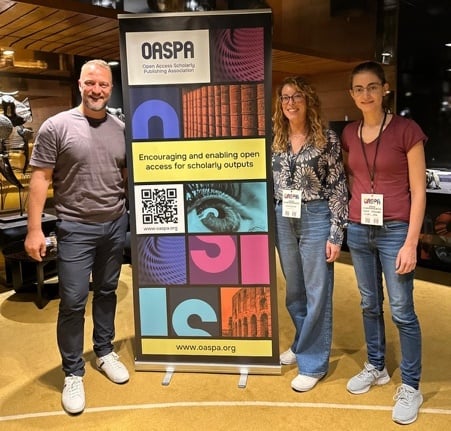
It’s important to participate in industry conferences such as OASPA in order to be part of the discussions and remain at the forefront of the OA movement.
It’s an opportunity to build meaningful relationships with organizations that share our commitment to OA.
While sponsorship is one way to show our support, it’s clear that being part of the conversation through participating in the OASPA groups and committee is what really makes a difference.
It took the last 20 years for more than 50% of the world's research to be published via open access. This provides a sobering reminder that flipping the remaining 50% will be a big challenge.
An important takeaway for me was that there is no "one-size-fits-all" solution for OA challenges: different regions and different stakeholders need different forms of support, whether it is infrastructure, funding, education, or policy, for example. I also enjoyed Rebecca Ross' presentation on how OA can drive action on climate. A few panellists shared the need for transparency in the peer-review process, advocating for open review reports, which is something we have been offering since 2014.
Speaking of openness, we are excited to celebrate Open Access Week 2024 with the scholarly community from 21–27 October. I look forward to sharing a recap of our activities in the next newsletter.
Chief Executive Officer
MDPI AG
3 October 2024
Agronomy | Feature Papers in Section “Grassland and Pasture Science”
1. “Sustainable Grazing by Cattle and Sheep for Semi-Natural Grasslands in Sweden”
by Anders Glimskär, Jan Hultgren, Matthew Hiron, Rebecka Westin, Eddie A. M. Bokkers and Linda J. Keeling
Agronomy 2023, 13(10), 2469; https://doi.org/10.3390/agronomy13102469
Full text available online: https://www.mdpi.com/2073-4395/13/10/2469
2. “Foliar Application of Carnosine and Chitosan Improving Drought Tolerance in Bermudagrass”
by Tian Hao, Zhimin Yang, Jianfeng Liang, Jingjin Yu and Jun Liu
Agronomy 2023, 13(2), 442; https://doi.org/10.3390/agronomy13020442
Full text available online: https://www.mdpi.com/2073-4395/13/2/442
3. “Predicting Long-Term Effects of Alternative Management Practices in Conventional and Organic Agricultural Systems on Soil Carbon Stocks Using the DayCent Model”
by Caio Fernandes Zani, Mohamed Abdalla, Geoffrey Denis Abbott, James Arnold Taylor, Marcelo Valadares Galdos, Julia Mary Cooper and Elisa Lopez-Capel
Agronomy 2023, 13(4), 1093; https://doi.org/10.3390/agronomy13041093
Full text available online: https://www.mdpi.com/2073-4395/13/4/1093
4. “Accumulation of Alkaloids in Different Tall Fescue KY31 Clones Harboring the Common Toxic Epichloë coenophiala Endophyte under Field Conditions”
by Randy D. Dinkins, Brenda L. Coe, Timothy D. Phillips and Huihua Ji
Agronomy 2023, 13(2), 356; https://doi.org/10.3390/agronomy13020356
Full text available online: https://www.mdpi.com/2073-4395/13/2/356
5. “Dung Beetle Activity Is Soil-Type-Dependent and Modulates Pasture Growth and Associated Soil Microbiome”
by Long Ma, Nirodha Weeraratne, Saliya Gurusinghe , Jesmin Aktar, K. M. Shamsul Haque, Philip Eberbach, Geoff G. Gurr and Leslie A. Weston
Agronomy 2023, 13(2), 325; https://doi.org/10.3390/agronomy13020325
Full text available online: https://www.mdpi.com/2073-4395/13/2/325
6. “Yield, Nutritional Composition, and In Vitro Ruminal Digestibility of Conventional and Brown Midrib (BMR) Corn for Silage as Affected by Planting Population and Harvest Maturity”
by Omar Manuel Peña, Cesar Velasquez, Gonzalo Ferreira and Matias Jose Aguerre
Agronomy 2023, 13(5), 1414; https://doi.org/10.3390/agronomy13051414
Full text available online: https://www.mdpi.com/2073-4395/13/5/1414
7. “Effect of Poultry Litter Application Method and Rainfall and Delayed Wrapping on Warm-Season Grass Baleage”
by Christine C. Nieman, Wayne K. Coblentz, Philip A. Moore, Jr. and Matthew S. Akins
Agronomy 2023, 13(7), 1896; https://doi.org/10.3390/agronomy13071896
Full text available online: https://www.mdpi.com/2073-4395/13/7/1896
8. “Karrikin1 Enhances Drought Tolerance in Creeping Bentgrass in Association with Antioxidative Protection and Regulation of Stress-Responsive Gene Expression”
by Zhen-Zhen Tan, Yi-Ting Wang, Xia-Xiang Zhang, Heng-Yue Jiang, Ya Li , Li-Li Zhuang, Jing-Jin Yu and Zhi-Min Yang
Agronomy 2023, 13(3), 675; https://doi.org/10.3390/agronomy13030675
Full text available online: https://www.mdpi.com/2073-4395/13/3/675
9. “The Impact of Rotational Pasture Management for Farm-Bred Fallow Deer (Dama dama) on Fodder Quality in the Context of Animal Welfare”
by Mariusz Kulik, Katarzyna Tajchman, Antoni Lipiec, Maciej Bąkowski, Aleksandra Ukalska-Jaruga, Francisco Ceacero, Monika Pecio and˙Zaneta Steiner-Bogdaszewska
Agronomy 2023, 13(4), 1155; https://doi.org/10.3390/agronomy13041155
Full text available online: https://www.mdpi.com/2073-4395/13/4/1155
10. “Effect of Inoculants and Sealing Delay on the Fermentation Quality of Early Harvested Wheat Forage”
by Lorenzo Serva, Sarah Currò, Igino Andrighetto, Giorgio Marchesini and Luisa Magrin
Agronomy 2023, 13(2), 508; https://doi.org/10.3390/agronomy13020508
Full text available online: https://www.mdpi.com/2073-4395/13/2/508
3 October 2024
Agronomy | Feature Papers in Section “Innovative Cropping Systems”
1. “Performance of Winter Wheat (Triticum aestivum) Depending on Fungicide Application and Nitrogen Top-Dressing Rate”
by Zinta Gaile, Biruta Bankina, Ieva Pluduma-Paunina, Linda Sterna, Gunita Bimsteine, Agrita Svarta, Janis Kaneps, Irina Arhipova and Aigars Sutka
Agronomy 2023, 13(2), 318; https://doi.org/10.3390/agronomy13020318
Full text available online: https://www.mdpi.com/2073-4395/13/2/318
2. “Winter Oilseed Rape: Agronomic Management in Different Tillage Systems and Seed Quality”
by Mateusz Sokólski, Dariusz Załuski, Artur Szatkowski and Krzysztof Józef Jankowski
Agronomy 2023, 13(2), 524; https://doi.org/10.3390/agronomy13020524
Full text available online: https://www.mdpi.com/2073-4395/13/2/524
3. “Optimizing Biochar Particle Size for Plant Growth and Mitigation of Soil Salinization”
by Esther Tang, Wenxi Liao and Sean C. Thomas
Agronomy 2023, 13(5), 1394; https://doi.org/10.3390/agronomy13051394
Full text available online: https://www.mdpi.com/2073-4395/13/5/1394
4. “Evaluation of Vegetative Development of Quinoa under Water Stress by Applying Different Organic Amendments”
by Muhammad Zubair Akram, Angela Libutti and Anna Rita Rivelli
Agronomy 2023, 13(5), 1412; https://doi.org/10.3390/agronomy13051412
Full text available online: https://www.mdpi.com/2073-4395/13/5/1412
5. “AMMI Analysis of Genotype × Environment Interaction on Sugar Beet (Beta vulgaris L.) Yield, Sugar Content and Production in Romania”
by Camelia Oroian, Florin Ugrutan, Iulia Cristina Muresan, Ioan Oroian, Antonia Odagiu, Ioan Valentin Petrescu-Mag and Petru Burduhos
Agronomy 2023, 13(10), 2549; https://doi.org/10.3390/agronomy13102549
Full text available online: https://www.mdpi.com/2073-4395/13/10/2549
6. “Plasma Treated Cattle Slurry Moderately Increases Cereal Yields”
by Thomas Cottis, Hesam Mousavi and Svein Øivind Solberg
Agronomy 2023, 13(6), 1549; https://doi.org/10.3390/agronomy13061549
Full text available online: https://www.mdpi.com/2073-4395/13/6/1549
7. “Effects of Different Types of Soil Management on Organic Carbon and Nitrogen Contents and the Stability Index of a Durum Wheat–Faba Bean Rotation under a Mediterranean Climate”
by Luigi Tedone, Leonardo Verdini and Giuseppe De Mastro
Agronomy 2023, 13(5), 1298; https://doi.org/10.3390/agronomy13051298
Full text available online: https://www.mdpi.com/2073-4395/13/5/1298
8. “Irrigation Water and Nitrogen Fertilizer Management in Potato (Solanum tuberosum L.): A Review”
by Bhimsen Shrestha, Murali Darapuneni, Blair L. Stringam, Kevin Lombard and Koffi Djaman
Agronomy 2023, 13(10), 2566; https://doi.org/10.3390/agronomy13102566
Full text available online: https://www.mdpi.com/2073-4395/13/10/2566
9. ”Melon (Cucumis melo L.) Fruit Yield under Irrigation and Mycorrhiza Conditions”
by Halina Buczkowska, Andrzej Sałata and Renata Nurzyńska-Wierdak
Agronomy 2023, 13(6), 1559; https://doi.org/10.3390/agronomy13061559
Full text available online: https://www.mdpi.com/2073-4395/13/6/1559
10. “Optimizing Planting Density in Alpine Mountain Strawberry Cultivation in Martell Valley, Italy”
by Sebastian Soppelsa, Michael Gasser and Massimo Zago
Agronomy 2023, 13(5), 1422; https://doi.org/10.3390/agronomy13051422
Full text available online: https://www.mdpi.com/2073-4395/13/5/1422
3 October 2024
Meet Us at the 2024 ASA, CSSA, SSSA International Annual Meeting, 10–13 November 2024, San Antonio, USA

MDPI will be attending the 2024 ASA (American Society of Agronomy), CSSA (Crop Science Society of America), and SSSA (Soil Science Society of America) International Annual Meeting which will be held from 10 to 13 November 2024 in San Antonio, USA.
The 2024 ASA, CSSA, & SSSA International Annual Meeting draws over 4,000 professionals and is known for attracting a diverse group of scientists, researchers, educators, consultants, and policymakers specializing in areas such as plant breeding, soil health, agronomic systems, environmental sustainability, and crop management. This event provides a dynamic platform for sharing best-in-class research, exploring innovative solutions, and addressing the challenges of global food security and environmental stewardship.
For our MDPI community, this event is an invaluable opportunity for professional development, networking, and collaboration. It is not only a place to stay current with the latest scientific advancements but also to connect with like-minded professionals, expand your network, and explore career possibilities.
We encourage you to attend, connect, and grow alongside thousands of other professionals committed to making a difference in the field of agricultural science.
The following MDPI journals will be represented at the conference:
- Agronomy (leading);
- Agriculture (leading);
- Plants;
- Land;
- Seeds;
- AgriEngineering;
- Nitrogen;
- Crops;
- Horticulturae;
- Technologies;
- Climate;
- Sustainability;
- Applied Sciences;
- Drones;
- Environments;
- Actuators;
- Robotics;
- Computers;
- Remote Sensing;
- AI.
If you are planning to attend the above conference, we encourage you to visit our booth and speak to our representatives. We are eager to meet you in person and assist you with any queries that you may have.
For more information about the conference, please visit its official website at https://www.acsmeetings.org/.
29 September 2024
MDPI New Journal Proposal—Invitation to Shape the Future of Open Science Together

As a leader in open access publishing, MDPI is eager to explore new collaboration opportunities, including the launch of new journals and the transfer of existing ones. At present, MDPI publishes over 400 journals, more than 160 of which have established partnerships with academic organizations. Additionally, we publish 19 association journals.
In order to enhance exchange and cooperation with scientific researchers and share the results of open science, MDPI invites experts and scholars from various fields to submit proposals for new journal collaboration opportunities. If your proposal is approved, you could take on the role of Editor-in-Chief, Deputy Editor-in-Chief, or Editorial Board Member of the journal. This position allows you to manage the manuscript review process alongside our editorial department, participate in calls for papers, strengthen your network with scholars in the field, expand scientific research cooperation, enhance your personal and academic influence internationally, and play a leading role in academia.
Once the new journal is online, MDPI will provide a variety of promotional channels to market the journal internationally.
MDPI will offer various promotional channels to enhance its visibility and promote it internationally.
How can you determine the theme of a new journal?
- Assess research hotspots/academic frontiers;
- Assess pioneers in the field/key research directions of universities;
- Determine whether MDPI has already established a journal in the field.
You can browse MDPI’s existing journals at the following link: https://www.mdpi.com/about/journals.
Advantages of collaborating with MDPI:
- MDPI is a global leader in open-access publishing with extensive academic resources.
- MDPI offers a professional publishing team that provides comprehensive support throughout the publishing process.
- MDPI’s diverse promotional platforms and channels help journals quickly increase their international visibility and influence.
We invite you to submit new journal proposal here, and contribute to academic development! In addition, if your institution (university, institute, college, national key laboratory, society, etc.) intends to establish a journal, you can also submit a draft to MDPI on its behalf.
27 September 2024
MDPI’s 2023 Travel Awards—Winners Announced

MDPI journals frequently grant travel awards to empower junior researchers to showcase their latest research at academic conferences, thereby amplifying their impact within their research fields.
We extend our heartfelt congratulations to the 103 recipients of MDPI's 2023 Travel Awards from different countries and territories for their exceptional presentations. These outstanding individuals were selected by the journal editors based on the strength of their research proposals and the anticipated impact of their presentations at academic conferences. We commend their exceptional contributions and wish them continued success in their academic endeavors.
MDPI will continue to provide support and recognition to the academic community. To learn more about the list of awardees, please visit the following pages:
- Biology and Life Sciences;
- Chemistry and Materials Sciences;
- Engineering;
- Environmental and Earth Sciences;
- Medicine and Pharmacology;
- Public Health and Healthcare;
- Others.
About MDPI Awards:
To reward the academic community, especially young researchers, and enhance communication among scientists, MDPI journals regularly offer various awards to researchers in specific fields. These awards, serving as a source of inspiration and recognition, help raise the influence of talented individuals who have been credited with outstanding achievements and are making a significant contribution to the advancement of their fields.
To explore more MDPI awards, please click here.
Go to page chevron_left 1 2 3 4 5 chevron_right last_page



